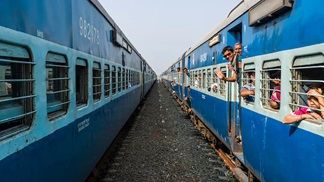The Indian Railways is learnt to be treading cautiously with its plans to install artificial intelligence (AI)-powered CCTV cameras on trains after it found that suspected Chinese-origin cameras had been installed at several railway stations, exposing these assets to potential security breach by Beijing.
To boost rail network safety, the railways, some months ago, had decided to install around 75,000 AI-powered CCTV cameras in coaches and locomotives at an estimated expenditure of Rs 15,000 crore. The plan was to cover 40,000 coaches, 14,000 locomotives and 6,000 EMUs (electric multiple units), commonly known as local trains.
The project ran into hiccups when scrutiny by the railways of the cameras installed at stations found a ‘discrepancy’ in the mention of the country of origin of the cameras in the invoice generated by the company supplying the devices to the South Western Railway.
In an internal note the office of the deputy chief signal and telecom engineer, South Western Railway, Bengaluru, stated that the vigilance branch of railways had found an anomaly in the country of origin stated in the invoice. While the invoice mentioned Taiwan, the original invoice from the Air Cargo Complex, Mumbai Customs, listed the country of origin as ‘Taiwan, China’. “This inconsistency raises concerns regarding potential tampering of documents to conceal the actual country of origin,” stated the internal note. The note advised that stringent action be taken to fix responsibility for the submission of altered or forged invoices.
The Telecom Equipment Manufacturers Association of India (TEMA), which has been flagging the issue of threat from Chinese-origin cameras, has written to the chairman of the Railway Board that given the matter of internal security, there be no delay in getting a third party inspection of the cameras installed or proposed for installation by the railways. TEMA said a detailed audit of the CCTV devices should be done in accordance with the technical advisory note on security guidelines for CCTV network of the railway ministry’s Research Design and Standards Organisation.
Earlier, a series of deliberations were held by the Union government on the measures to be adopted to protect India’s national and security assets from alleged snooping by Beijing, carried out via a web of Chinese-origin CCTV cameras installed across government and military establishments.
Following the deliberations, the government came out with safety guidelines in April, with the Union ministry of electronics and information technology (MeitY) amending the ‘compulsory registration order’ for CCTV cameras sold in India. The amendment makes the testing of ‘essential security parameters’ of all CCTV cameras mandatory.
Test reports from Bureau of Indian Standards-recognised labs, such as the Standardisation Testing and Quality Certification, were to be submitted by the manufacturers. However, given the massive network of such cameras in the country, the new regulation is to come into effect from October 9 this year, thereby allowing manufacturers sufficient time to adapt.








